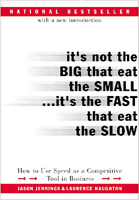 |
| ||||||||||||||||
 |
It's Not the Big that Eat the Small...It's the Fast that Eat the SlowJason Jennings and Laurence Haughton
Excerpt from It's Not the Big that Eat the Small...It's the Fast that Eat the Slow Chapter One: FAST THINKING Speed, merely for the sake of moving fast, without a destination in mind, is haste. Eventually, out of control, speed will land you in big trouble. But imagine how many more races you'd win if you had a big head start. Think about the advantage you'd have if you knew what the future was going to look like and were able to spot trends before the competition. Consider the power of being able to think about things quickly and accurately, tackling in minutes the same big issues and questions the competition would be processing for weeks. Imagine for a moment the exhilaration of working in an environment where politics and palace intrigue were a thing of the past and the best idea truly wins. Such an organization would be much faster than its rivals. In this part, you'll learn how the fastest companies in the world think fast because of their ability to:
AnticipateAnticipation: expecting; being aware of something in advance; to regard as possible. The ability to anticipate is one of the key ingredients of efficient speed. Chances are that if you just take off without a clear view, not knowing where you're headed, you'll end up panting, out of breath, and no better off than when you began. Maybe you'll be worse off for the exhaustion. How can you select the right destination? How can you do a better job of anticipating what might happen, seeing the outcomes, consequences, and results in advance? An experiment from The Economist, titled, "Garbage In-Garbage Out: Economic Forecasting, The Accuracy of the Dustmen's Predictions," puts the need for anticipation in perspective: In 1984, a questionnaire was sent to four ex-Finance Ministers, four Chairmen of multinational firms, four students at Oxford and four London Dustmen (referred to in the U.S. as Garbage men). The garbage men did a better job of anticipating what would happen than the government officials and Oxford students. Knowing what things are going to look like in advance can help you make the right decisions. Anticipation is natural. Everyone does it every day. We anticipate what the weather will be when we decide which clothing to wear. Moms and dads anticipate the family's transportation needs when deciding which vehicle to purchase. We even anticipate what kind of day we'll have at the office based on the gruffness or friendliness of the boss's morning greeting (or lack thereof). Some people anticipate better than others to the extent of impacting our lifestyle. In 1953, C. A. Swanson and Sons, a poultry producer, was stuck with 260 tons of frozen turkey and insufficient storage room. They kept moving it around the country in freezer boxcars. Jerry Thomas, a salesman for the company, was on a business trip, noticed the three-compartment aluminum trays used to serve airline meals, and an idea clicked. Observing that the television was fast replacing the fireplace as the centerpiece of most American homes, he anticipated a society where the family would begin eating in the living room in front of the television. He wondered: What if you took that frozen turkey, put it into those aluminum trays alongside some stuffing and potatoes, and called them TV dinners? A half century and 6 billion dinners later, Swanson still sells more than 150 million TV dinners each year. Jerry Thomas had anticipated correctly. In 1990, Leopoldo Fernando Pujals, a sales manager for Johnson & Johnson in Spain, began taking notice of the droves of women entering the Spanish work force and reasoned they'd be too tired to cook at the end of the day. He anticipated the end of siestas, late-night dinners, and heavy Spanish cuisine and saw a need for home-delivered food. He founded Telepizza and ten years later was presiding over an empire with 1,000 restaurants worth $2 billion. In 1992, Steve Case became CEO of AOL, a fledgling online service provider that counted as its customers geeks who spent their free time in the basement playing computer games. While the company's total number of customers could be counted in the thousands, Case envisioned a new world. He anticipated a planet where personal computers were as common as telephones and televisions, and, less than ten years later, the company he'd built from scratch gobbled up media giant Time Warner in a transaction valued at $166 billion (Dow Jones Business Wire, January 10, 2000). Sabeer Bhatia was an Indian immigrant in the United States who spent his days watching other young computer engineers grow wealthy through their involvement in Web-based start-ups. He and his future business partner Jack Clark wanted to be rich as well. In 1996, determined to launch a company, Bhatia and Clark began spending all their free time writing the code for Java-Soft, their intended product. The duo quickly became frustrated by their inability to transfer data files between them and wondered how they could get around the fire walls designed to keep outsiders away from their respective employers' computer systems. Wouldn't it be great, they reasoned, if there were a way for everyone to have a private e-mail box? They anticipated a world in which everyone would have an e-mail address. Twenty-two months later, they sold their company—Hotmail—which by then had more than 20 million Microsoft clients and more than $400 million in Microsoft shares. Unfortunately, most people limit exercising their anticipatory skill to daily matters such as food, clothing, and personal finances. What might happen if you could anticipate as well as Jerry Thomas, Steve Case, Leo Pujals, Sabeer Bhatia, and the other tens of thousands of business people like them who have changed the world. You can. ...—From It's Not the Big that Eat the Small...It's the Fast that Eat the Slow, by Jason Jennings, Laurence Haughton. ©
January 9, 2001, HarperCollins used by permission.
|
|||||||||||||||||||||
|
All prices subject to change and given in U.S. Dollars. |
All materials contained in http://www.LeadershipNow.com are protected by copyright and trademark laws and may not be used for any purpose whatsoever other than private, non-commercial viewing purposes. Derivative works and other unauthorized copying or use of stills, video footage, text or graphics is expressly prohibited. LeadershipNow is a trademark of M2 Communications, LLC. |
